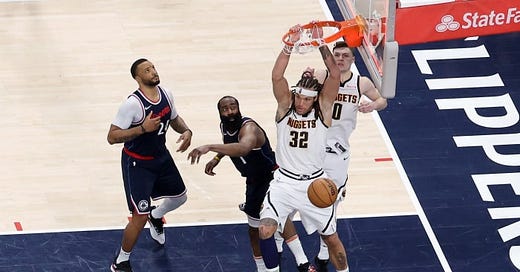How Two Playoff Teams are Losing While Winning
Sometimes the team that scores the most points doesn’t win the series
Professional sports aren’t all that complicated. They’re just games of addition. If you score more points, runs, or goals, you win. It’s easy peasy, but I’d like to introduce you to the lemon squeezy on a paper cut called the NBA playoffs. Playoff series don’t care how many points you score. Sure, you need to score more points than your opponent to win the game, and you need a certain number of wins to advance, but you’re not obligated to outscore your opponent over the totality of the series. And as it stands, we have two teams who may be knocked out of the playoffs while outscoring their opponent.
The Houston Rockets and the Los Angeles Clippers find themselves in 3-2 series deficits and are in the dreaded “every game is an elimination” abyss. However, based on point differential, the thing that determines who wins a single game, their precarious situation feels a bit unfair. The Rockets have outscored the Golden State Warriors by six points in their series and own a +1.3 net rating, and the Clippers have a +17 point differential against the Denver Nuggets and a +3.6 net rating. I know what you’re thinking, I’m sure this happens all the time, and you’d be wrong.
Since the 1959-60 season, there have been 39 teams that have posted a point differential of zero or better and still managed to lose their first-round playoff series. In that span, there have been 406 first-round playoff series, meaning 0.96% of the time, a team that wasn’t outscored was eliminated, and 2024-25 has a chance to provide us with two for just the second time in history.
Over the course of 224 playoff games, this unlucky bunch managed to outscore their opponents by 371 points. Using a basic Pythagorean win calculator, you’d expect a team with their point differential to win 56% of their games, but instead, they’ve only won 37.9%. For obvious reasons, none of these series were a sweep, but nine teams managed to outscore their opponent throughout a series with only one win. Seven came in a best-of-five series, one in a best-of-three, and somehow in 2002-03, the Dallas Mavericks outscored the Sacramento Kings by seven points with a single win in a series where they lost four games.
Now, the Rockets and Clippers aren’t out of the woods if they want to join this group of elite playoff losers. They could always win their remaining two games and join the more celebrated group of teams that make it out of the first round, and forcing a game seven for either would go a long way in ensuring they finish their series with a positive point differential. Also, the Rockets, with only a +6 point differential, could very easily slip into the negative should they lose game six. However, the Clippers have a chance to go down as one of the best teams to lose their first-round series.
The Clippers’ current playoff point differential of +17 would be the seventh highest for a team that did not advance since 1959-60, and they’re point off the top five. However, their chances of securing the top spot are incredibly slim. In 2017-18, the Indiana Pacers lost their opening round series to the LeBron James-led Cavaliers in seven games despite a +40 point differential. In that series, the Pacers won game one by 18 points, game six by 34 points, and their losses were either by three or four points. According to brutalist architectural principles, two blowouts and four close losses are how you build a towering point differential in a losing effort.
What makes the Clippers’ sterling point differential and net rating so surprising is that one of their three losses was by 16 points and one of their two wins was by three. Those two games add up to a point differential of -13, which means they have a +30 point differential across three games that include two losses. In a short series, a single 34-point win does a lot of heavy lifting.
At the end of the day, this is trivial trivia. Teams under and overperform their point differential all the time, but the urgency of the playoffs makes it feel much more cruel. The Rockets and Clippers don’t deserve to win these series because their point differential is positive, but at the same time, should they lose, their performances shouldn’t be lambasted. They played well, just not well enough to win the series. It’s just a reminder that in the playoffs, you can play better in the aggregate and still come up short.
For any inquiries about work, discussion, and the like, you can email me at nevin.l.brown@gmail.com.




